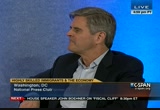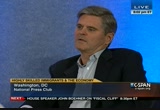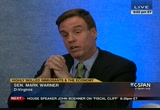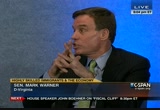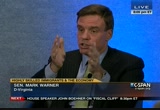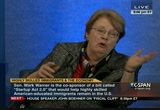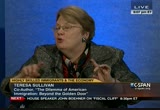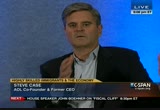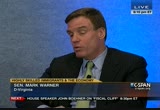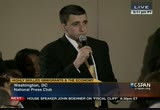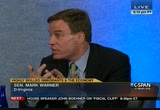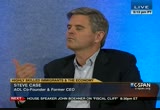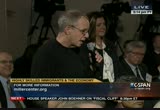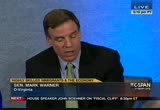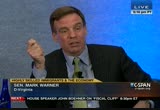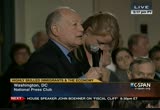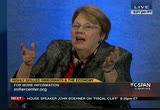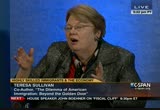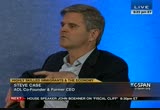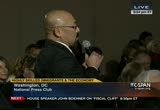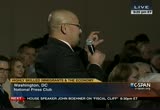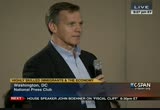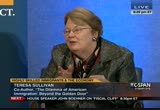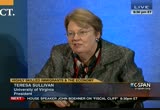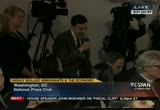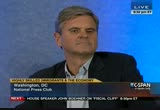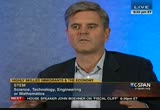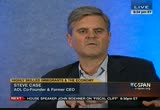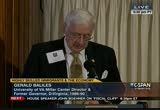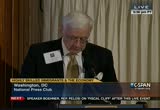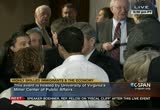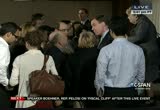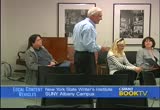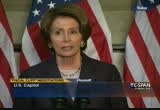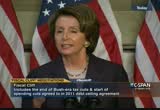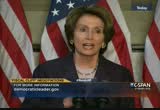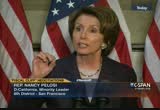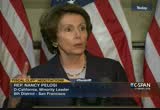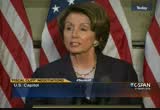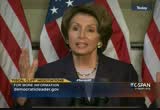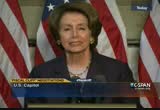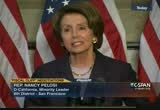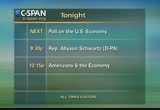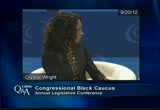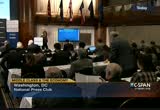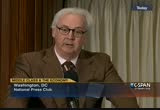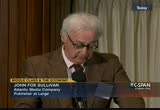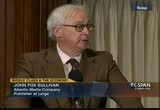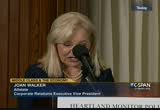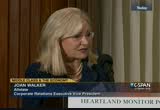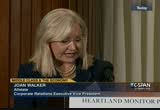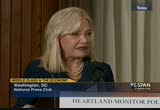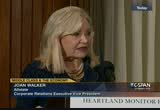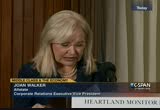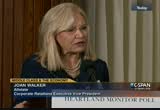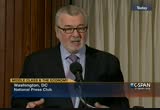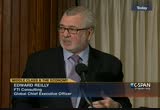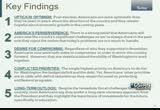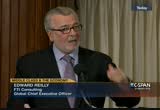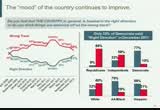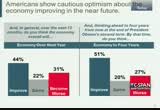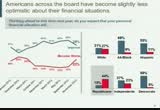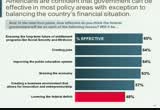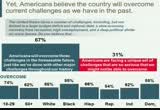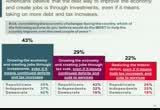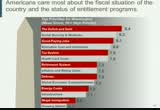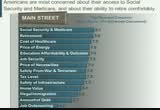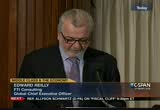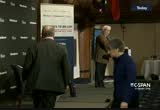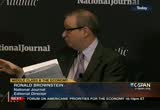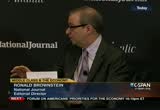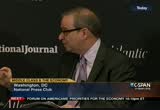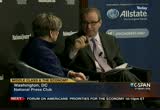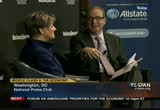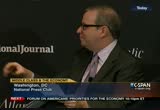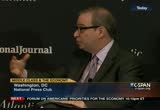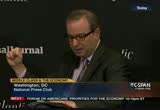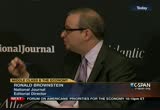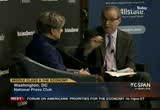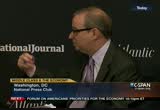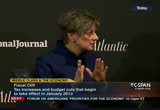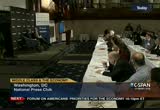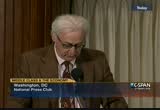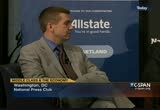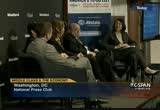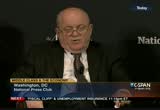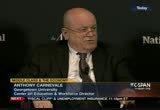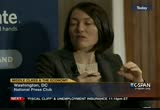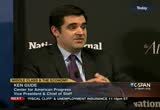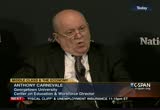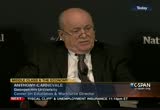tv Politics Public Policy Today CSPAN December 7, 2012 8:00pm-10:30pm EST
8:00 pm
to stay and serve, but i think we should ask them to stay or make it easy for them, not force them to become competitors that try to crush us. >> a lot of people in this audience know a lot more about this issue than i do, so i want to go to the audience. before i do that, i want the three of you to take out your crystal balls and tell us, the next 12 months, what will happen on this issue? steve? >> i am cautiously optimistic. six months ago, it passed with broad bipartisan support. with they came together on that legislation because it was important to provide sbrures with capital even though they said nothing could get done, something did get done. the good news people recognize
8:01 pm
the issue is important and there is a general agreement on the solution around high skilled immigration. the problem is is the politics and the economy and jobs have been prumped by the politics of immigration. i think there are four paths. one could be the pass the senate not be taken up in the senate. there is a lottery that would flult raising the overall level of immigration. if there was an agreement to include that that bill could be passed. a second option which is what the president has ind indicated he favors is to link high skilled immigration with the dream act. so it is a broader solution around immigration. the third would be to say this deals with the 50,000, this
8:02 pm
deals with a million five. the third would be deal with 11 million which clearly we have to as a nation deal with and there is a desire now more than there might have been a month ago to do. that and i've heard a number of people talk about the need to take up the issue and called for a comprehensive solution. so that's third. the fourth path would be to say that this immigration path in the short run is challenging and build support for the senator warner's bill, such as regulatory issues and commercialization of research. those strike me as the four paths. if i had to bet. i think something will happen this year and it will probably be number two or number three. i think something will happen linked to the dream act or some version of that or perhaps it's
8:03 pm
comprehensive immigration reform. i do worry, even though that's a problem we need to solve t more complicated it gets the harder it is to get done. but any of those four paths would be plausible. i'm optimistic that one of them would happen and does need to happen this year. if not, we're going to regret it. >> i am optimistic too but i still think there is an 80% chance we're not going over the fiscal cliff. if you look back at the history of in effect the immigration lottery system that we had, you'll find a lot of american entprures came through that program and this notion there is going to be a tradeoff,
8:04 pm
maybe preelection. that was the reality but not now. the change that took place on election day was these items like startup 2.0, serve for that. that's the starting point. dream act which i think is an embarrassment we didn't pass already, somebody who lives in a common wealth i see many kids grown up in virginia and gone to virginia hools and parents have paid taxes for years and in the process of trying to continue their american experience, we luckily were able to overturn legislation and try to exclude those folks from going to college. but that i think becomes now maybe not a given but it's sure as he can going to be fairly
8:05 pm
shortly. the chalsleng now going to be because there are these 11 million undocumented persons who work in america trying to sort through some path of legal status for those folks which i think has to be a national priority as well. so that the items of what could have passed before, there's been a size mick shift, people are going to say we need to do more here and not deal with just high scailed or not even just those kids when have lived here for years and give them a path to get an education or serve in our military. but i think we're going to be on that comprehensive. >> better than a 50% chance you have a comprehensive solution? >> i think. so i think there is going to be a subject of a lot of debate and discussion and we're going to need the scholars at the
8:06 pm
prom today and folks to help us think through this, do you take it as a series or comprehensive bill. >> i think it's hard to take an issue on which a lot of people agree and get action on it unless there's trust that some of the other issues that are maybe have less consensus have trust those issue also also get addressed. that's one of the reasons comprehensive immigration reform is attractive to ensure all the immigration issues get addressed at once. it's a reason that the senator's start up 2.0 bill is attractive is because it sees other issues. i want to pose another way that you could view the highly educated immigrant as part of a larger issue and that the non-instruction for our own students. what i see happening in many of
8:07 pm
the stitesths states and a greatly renude emphasis in why american students are not doing as well in the stem fields as you might expect and why we don't have our graduate schools full of app cants coming from american schools instead of so many foreign app cants. i would not want the rerl form of immigration for highly skilled workers to be a substitute of our own problem getting our own students excited in science and engineering. if we could cut the atransition rate of students in science and engineering, we could meet many of our need in the united states for stem workers. so i think it's important that we have the trust if we address the high skilled immigration issue, we don't do that as a substitute for looking at all these other issue that is still
8:08 pm
need work. your question ends up being do i trust that congress will do something and track vord not too good. >> one thing i want to say in response to senator warner who i agree with almost all the time which he said the election was a size mick shift. i think it's important that both sides don't overplay their hand. i understand the democratic side of president obama winning reelection and by a pretty significant electoral margin. it also was clear if you looked at the data that the reason for that predominantly was the latino vote. indeed one statistic if mitt romney had gotten the same percentage of latino vote george w. bush got he probably
8:09 pm
would have won. you have to get right with this demographic shift so republicans have to move quickly to compromise. democrats can hold our line it's our way or the highway. i've heard that in the last few weeks. button republican side the president won but 48% of people didn't support him and the republicans are in control of the house because of redistricting, most people in the house are in safe districts and will be punished if they move together and compromise. there is a recognition and something needs to happen. but it's going to require some genuine goodwill, trust, negotiations on both sides to come together for some common solution. they both basically are saying that's all fine, they have to
8:10 pm
compromise and these guys are saying over my dead body, we're not going to raise the overall immigration or amnesty or some of the things you hear. you're going to see a stalemate. it's going to require finding some common ground and work together and celebrate compromise. >> what you said at the end, i should go on. two things i think there is a much more alignment. the business community has been for comprehensive immigration reform for a long time. perhaps not as forcefully as i wish they would have been. there is no doubt there is a skilled immigration issue and a rational program that works in certain industries. but one part of immigration reform that might be the subject of a future miller
8:11 pm
sight discussion is i don't think we will get comprehensive immigration reform until we have, and this is a challenging issue, a thoughtful question aboutitety validation. and that pushes issues around immigration and homeland security, it pushes issues around electronic medical records. and the sooner we get thoughtful about that so that after immigration reform there is a way we have a right to enforce our borders and have an employer and employee ability to check the legal status of somebody working, that's going to push us into some uncomfortable conversations. >> questions, comments, we have one here. >> thank you for taking the time to speak with us today. my question is given the issue
8:12 pm
of out sourcing wharks impact do you think it has on immigration policy and should it have and vice verse sa? >> i think that that a lot of the original outsourcing was driven by difficult rerble cost in labor. i think one of the hidden stories that that has not been as reported is that's come down in low and mid skill immigration and tech jobs. i think one of the challenges with our current policies is companies that have global foot prince, if they can't hire that high skilled individual that comes out of an american university here but they can hire them in china they will be able to do so and it is tied
8:13 pm
into this high school immigration discussion. >> i got to add that technology has created more advanced ought mated factories and that has resulted in fewer jobs necessary to build products. there is no question about that and that is a negative in terms of job creation. but it's also positive in that we have seen a little bit of a trend, and we saw apple this week announce they were going to make one of their products in the united states. it was related to the economics underliing this. if you need fewer people to make the stuff, then the cost difficult rerble to make it here versus there i did minute shs then the argument is we can make it. number two there is a national advisory counsel and one of the areas of focus has been in additive manufacturing which is
8:14 pm
really an interesting area. over the next decade it has the potential to have much more personal liesed approach, more custo approaches to manufacturing that could result in more things being made here as opposed to being made other places. so it is a concern but people are more optimistic now than five years ago because some of this technology advancing actually is starting to be in some sectors a little bit of a positive. >> over here. yeses. >> thank you for this excellent panel. my question is for senator warner and you mentioned a couple of changes you'd like to see with the veessa. the question i have for you is this remains a serious point of contention with information technology workers who have continuele pressure on their
8:15 pm
jobs. a lot of jobs have been moved overcease and those job losses have been facilitated by the hbv rks 1 visa. how are you going to address that? what kind of things can you put in a comprehensive reform that will actually help and protect some i.. the workers here from having their jobs going overcease? >> a couple of points. one, we've talked about a stem, a graduate stem visa, one category over here. that really is at those very kind of high knowledge level jobs. we again, most folks would acknowledge, we are not producing enough of our own. the h 1 b is silent on the totals. and i think that you raise a
8:16 pm
valid point but a part of what i believe about being able to drive i.. the jobs back into america, one of the things i think we've done a fairly dreadful job on is finding those mid tech jobs that could be very easily located in rural america. where the most push back against immigration changes and about the transform tive change brought about by the information sage rural america. they say we can build it anywhere but we haven't done a good job of building it in martensville virginia. i think there is a chance of mid tech jobs that are attractive. i have talked about the sbreprurel visa that says those individuals captive to that
8:17 pm
company that their path to legal status in america separate would be one the tooblet raise independent capital and hire additional americans. so in and of itself that would be a job creator and a job creator of americans. >> a question right here. >> i think that probably the most important point made tonight was made by president sullivan about timing. we've been successful in talking to the various countries they need to open up their markets for individual ent prenurelism and we see lots of people going back to india because we've opened up their markets there. and the other issue is china, we need to keep the chinese people here because when they
8:18 pm
go back they are going to compete with us. timing i think is everything and we need to get this going and now. and there is perhaps an important point in dividing the visa issue from the general immigration issue because one can be dealt with much more quickly than the other one can. >> any comments than? >> that's actually been my view for sometime. because of the urgency around invasion moving quickly to deal with high skill immigration is the rights way to go and very supportive of what senator war warner have been doing and if trfs a consensus in the white house i would be delighted. my own assessment is that's unlikely. unless there say broader
8:19 pm
solution around immigration, doesn't have to be everything which is why it might be the start back plus the dream act. it could be comprehensive. my own guess is that reading the tea leaves this -- my day job is vesting companies this is like moonlighting on the side lines so there are people up here who know a lot more than i do but my sense of it talking to people doing it in a bipartisan kind of way it probably at this point in order to get traction there needs to be a broader discussion on immigration. >> there is a question right here up front. we'll do that and then here. >> i'm an immigrant. i've been here about 13 years. i think i'm still trying to get
8:20 pm
a green card. i'm still on a visa. my question is i feel like we're at a chire practice, we are singing the same hymn and talking about the pitch of the hymn. i feel the immigrant as a brand is a bad brand in the united states. my question is how do we change the brand of immigrant and make it more positive because i think that will enable legislation that will get all these things we're talking about to get done. i've been here 13 years. i've never had anybody say to me anything negative personal little about being an immigrant but i know the immigrant brand is not so positive in the united states. so how do we change that image of immigrants and let people know immigrants are making a lot of contributions.
8:21 pm
i think somebody mentioned the i don't go gurt, i had no idea it was an immigrant's company. there are all these companies which maybe it needs to be like a marketing campaign, i don't know, but something i think should be done to change the image of immigrants and make it more posssive. and i think that will facilitate everything that we're talking about today. how do you guys think we can maybe change that image of immigrants and make it more positive and not make everybody when they think of immigrants they think of border wars on history channel? >> well, at different times and places immigrants have been viewed more or less favorably in the united states. this is a nation of immigrants but when immigration was largely cut off during the
8:22 pm
1920's a lot of americans became estranged from the immigrant roots of their forebearers and lost the sense that we were a nation of immigrants. but in some parts of the country today you see the enormous vitality that comes with a really diverse and active population that attracts immigrants and the kind of zestfulness they add to a community like those in northern virginia or southern california or texas where i spent most of my adult life. so i'm not sure it's true that everybody has a negative attachment to immigration. but on the other hand, i think the political controversy about immigration much about undocumented immigrants has led people to a negative cast to immigration. i can tell you that the united states as well as europe and many other countries including eventually china because of our current demographic situation, we will turn to immigration
8:23 pm
increasingly because our ter tilt is approaching below replacement level so immigration will be a necessity. the chinese are thinking about the fact their one child policy is going to lead to them having a much older population soon with fewer children. so immigration becomes another way they can continue the economic vitality of their country. so to me immigration and vitality are closely linked. i think that's true for many business people in the united states and the university. not too sure about the politicians. >> i think we have to remind people the story of america is a story of immigration. some of the most iconic companies in the country were founded by immigrants. it's been the history for a long time. i believe the reason it's so
8:24 pm
sensitive now is the debate around immigration is the debate around illegal immigration and there needs to be more focus on legal immigration and less about the problem and more about the opportunity. and then reframing it is winning the global battle for talent that is the next industries that are going to drive the next century. >> i'm an immigrant and naturalized citizen and started my own company. i'm a big fan of president sullivan. my question is that we talk about immigration coming here. but i think one of the questions i want to ask the panel is about the unknown immigration that's going the other way. with the immigration policy that's been set up, we have
8:25 pm
many universities setting you will up outpost basically taking the talent pool of our professors and science leaders and spreading it throughout. and also the whole notion that in china and india where there is a tremendous amount of university research parks being built and they are being created where the labs are ready to go, it's worse than that, isn't it? they are offering superstar professors double the salary and everything they want plus if you're in the medical field, any type of clinical testing you want to do to make sure that your almosts get going because they have different laws than we do. if there say technology drain, it's also in terms of the u.s. laws we only prohibit certain type of technology that has to
8:26 pm
do with national security and technology. but when you talk in steve's case the talent of the invite tive things that get sucked out along with that, that's nobody really talks about that so i'd like to hear from you. >> it's true. what you are saying is true. it goes back to what i was saying the other countries are being a magnet for talent, there is no question about this so we have to recognize that is happening and make sure we're competitive. my own view is if people want to come here and get an education and go back to their country, fine, that is a way to build stronger committees in other parts of the world. that is part of our stated policy. having people come here if they want to go back and start
8:27 pm
companies there, that's fine. but we should at least give them the option of staying here. if they want to go back fine, but don't force them. encourage them to stay because we need smart people here working on these new technologies. we are not going to grow more than 2% unless we invite more. we're not going to get our unemployment down below 08 hearse unless we invite more. almost all the net jobs in the last 30 years have been created by young high growth companies. so this is the place to focus. >> right here. >> thank you. my name is ed bell and the topic i have on my mind is at an intersection of the areas of interest of our fine panelists
8:28 pm
and that the online education, connect ivet the internet, education, there seems to be a trend toward fwreater access to education, making the great institution that is we have in this country available to people throughout our country and throughout the world either inexpensively or in many cases for free. and this creates in some sense a competitive landscape for us across the world where we are educating our competitors without requiring them to come to our country and i have two questions related to that. is that a concern that should be factored into the discussion around online education? and two, if we are creating competitors across the world, do we look at ideas like steve
8:29 pm
suggested in terms of encouraging people we educate here to stay here, extend that to say people we are educating across the world, encourage them to come here so we are not creating competitors that we then have to deal with ourselves? >> i think one area there that people have been interested in are the massively open online courses. the university of virginia will begin offering five of those next month. and the last i checked we had 172,000 people registered for them and most of those people are outside the united states. on the other hand those are people who won't get a transcript or credit. they will be exposed to the knowledge. one of the reasons we are interested in this is because our faculty want to learn how to teach in this way and because we believe that students learn differently in this way. so from that perspective it doesn't matter whether the
8:30 pm
student is inside the united states or outside the united states, we're interested in what the interactions r. but you raise an interesting point that we give away the information. and i think that is true and i think it will offer lots of people the opportunity to learn, i could do college level work and this is more interesting than i thought. and i hope one outcome will be people who might not have thought about a college education will seek one. i tell you as a president we think that education is much more than sitting in front of your computer screen and doing the course online. we think the education is much more than that. and that's what just fice your moving to a place where you are together 24/7 inside the class and outside the class. there is much more going on in
8:31 pm
the educational experience than just the transmission of knowledge. >> if you do it from shanghai you would have to plaster your apartment with pictures of thomas jefferson to get the full experience. >> i'm stanley cook. i'm a strong supporter of the university and the miller center. so in a way i hate to bring up this point. there is some decent out there and i cite two sources, one not exactly a bass chan of conservative open borders, "the washington post," and i particularly direct this comment to steve and suggest he tuth have some conversation with the post. on the seventh of july, it put out a major article and this
8:32 pm
was the headline. u.s. pushes for more scientists but the jobs aren't there. i'll give you a quote in a moment. i did take the opportunity since my agency has a few scientists to interview about this and i said what is your opinion. not all, but the consensus overall, why are we here, we're here because the jobs aren't in the private realm. a second source was organized labor that i recently went to in view of this forum and the public relations person said we agree with the "washington post." i'll leave you with one quote and i invite steve to approach the post. there have been many predictions of science labor
8:33 pm
shortages said the editor of the online magazine science careers and yet it seems awfulfully hard for people to find a job. anyone who goes into science expecting employers to clam more for their services will be deeply disappointed. >> well, i do talk to the "washington post." they don't necessarily always listen. i don't recall seeing that particular article but i can make a couple of points which first of all, there are on thes of jobs and we talk to most companies and they are sbralt for people with engineering degrees and there is a problem there in every industry. and ultimately it comes down to
8:34 pm
startups. people talk about business in the private sector like it's one thing. there is a small business sector and there are a lot of jobs created by that sector. there is a big business sector and a lot of jobs. there but the growth in jobs and the eleven fladge terms of invasion are these young growth companies and they do require skilled workers. one km started with four people and four years later they have 4,000. the last point i make is people focus on technology like it's an isolated industry and that's why silicon valley becomes a approximate exi for it. almost every company is a technology company. wal-mart are heavy users of technology.
8:35 pm
technology -- we need engineers not just for technology companies but for every sector and engineering is a key skill set and their biggest chalsleng attracting enough talent while other people as well as other nations trying to disrupt us are stepping up their game. so this has to be a compelling topic otherwise you wouldn't have this large a crowd sitting here at 8:30 on a friday night. either that or you have no other alternative. we're going to give the final word to our host. >> thank you allen. and i want to thank fur distinguished panel and moderator and to thank all of you for attending this very robust, rich and engaging discussion tonight about the politics, the economics and the
8:36 pm
legal ramifications of high skilled immigration. in his first post election news conference, president obama stated that he was quote a believer. if you've got a ph.d. and stay here and start a business here, we shouldn't make it harder for you to stay here. you should encourage you to contribute to this society end quote. it is our hope with the endorsement of both parties policy makers in the united states will take steps to enact reforms that will help make this possible in the years ahead. for our part, at the miller center in the coming weeks, we will work with some leading academic journals in the field to publish the papers from today's sessions. please be on the look out for more about this publication on
8:37 pm
our website millercenter.org and on that website i might add you will find out just how focused and wide ranging our non-partisan work is on the subjects of the presidency, political history and policy issues of importance of the governance of this country which on behalf of the miller center and the university of virginia, thank you very much for being here tonight. we are adjourned.
8:42 pm
>> we will have this program again in about three hours on c-span. next john boehner and nancy pell low si on the so called fiscal clive. >> writers institute, i think the writers institute is something that is very important in the culture. we are a culture of words, of voices. words are key to our imagination and capacity to
8:43 pm
envision things. we ourselves are not completely tied to print on the page but i think that there is no other art form so ready accessible, other than film which we work with too. it cap chures the human spirit. >> this weekend join book tv as we look tpwhrind scenes at the history of new york capital city, albany saturday at noon eastern on book tv and on c-span2 >> house r house speaker told reporters the white house has
8:44 pm
wasted another week on negotiations over the fiscal cliff. >> this isn't a progress report because there is no progress to report. when it comes to the fiscal cliff that is threatening our economy and jobs the white house has wasted another week. secretary geithner came here to offer a plan that had twice the tax hikes that the president campaigned on and had more stimulus spending than in cuts. and an indefinite increase in the debt limit like for ever. now four days ago we offered a serious proposal based on testimony of president clinton's former chief of staff.
8:45 pm
since then there has been no count offer from the white house. instead reports indicate that the president has adopted a deliberate strategy to slow walk our economy right to the edge of the fiscal cliff. instead of reforming the tax code and cutting spending, the president wants to raise tax rates. but even if the president got the tax rate hike that he wanted, understand that we would continue to see trillion dollar deficits for as far as the eye can see. washington has got a spending problem, not a revenue problem. if the president doesn't agree with our proposal, i believe he's got an obligation to families and small businesses to offer a plan of his own, a plan that can pass both chambers of the congress. we're ready and eager to talk to the president about such a plan. >> you did speak with the president earlier this week. can you characterize that call? did he have any kind of count
8:46 pm
offer and we understand that he is making clear that it's got to be increase rates for the wealthy or no deal. are you willing to give a little bit? >> the phone call was pleasant but was more of the same. the conversations that the staff had yesterday were more of the same. it's time for the president if he's serious to come back to was a count offer. >> the jobs record indicated unemployment is down roughly a full point from this time last year. [inaudible] [inaudible] why take such a risk when the job numbers are improving. >> because increasing tax rates will hit many small businesses that produce 60 to 70% of the new jobs in our country. that's the whole issue here.
8:47 pm
[inaudible] what is your reaction to that? >> i think that's reckless talk. the case. racing taxes on small businesses is not going to help our economy and not going to help those seeking work. i came out the day after the election to puft receive knews on the table to take a step toward the president to try to resolve this. when is he going to take a step towards us? >> can you see some way you can agree to tax rate increase and protect small businesses at the
8:48 pm
same time, maybe going with the 37% or some middle ground? >> there are a lot of things that are possible. but none of it is going to be possible. the president insist on my way or the highway. that's not the way to get to an agreement that i think is important for the american people and very important for our economy. thanks. >> minority leader pelosi speaks today. here are her remarks. good morning. >> this morning we received the news that the economy added 146,000 jobs last month. the unemployment rate fell to
8:49 pm
7.7% and we mark the 33 reasonable doubt consecutive month of private sector job growth. our economy is moving forward but it could be growing at a faster rate if the republican leadership had taken up and passed some of president obama's job initiatives including the american jobs act and had passed the middle income tax cut. having done that held off those initiatives, speaker boehner says democrats are slow walking the economy to a fiscal cliff, yet this is the same republican leadership that had the house in session barely a full day this week. we've had the election. the president was clear in the campaign that he was advocating and fighting for the middle income tax cut. a tax cut which, by the way, gives everyone 100% of
8:50 pm
taxpayers a tax break. but it also asks that the upper 2% pay their fair share. since that election four weeks ago, the president -- we've had time, the president has given the republicans flexibility to come up with a credible specific plan. what they offered in return was an empty letter lacking in specifics. it was a further manifestation of the lack of agreement in the republican caucus with division on the middle income tax cut and no agreement on specifics in their plan, not even senator mcconnell endorsed the house republicans proposal. we can make a difference right now by bringing the middle income tax cut up for a vote to give once again, 100% of americans a tax relief. the senate has passed the bill, the president is poised with his pen to sign it. democrats are unified on it.
8:51 pm
we have a discharge petition to bring it to the floor. the only obstacle standing in the way of middle income tax relief are the republicans unwilling tons ask the top 2% to pay their fair share. this top 2% which otherwise gets a tax cut, it continues a tax cut in the middle income tax extension. this is a moment of truth. the clock is ticking, christmas is coming, the goose is getting fat but in many homes across america it is a very, very lean time. the facts are though very important to reiterate. democrats have already agreed in the budget control act and other cuts in this congress to 1.6 trillion dollars in cuts, in spending cuts. we've already agreed in the affordable care act and in the president's budget to over a
8:52 pm
trillion dollars in savings to medicare without doing any harm to beneficiaries and extended the life of medicare. what is lacking are the revenues. you cannot cut your way to deficit reduction. what does reduce the deficit are jobs, job creation. have the spending cuts, we have the medicare savings, what we need are the revenues. and that is what you have to ask the question, why are we not here to pass the middle income tax cut which unleashes the high end -- increases the high end contribution to the budget talks. why are we not here to pass the middle income tax cut? why are we not here to even
8:53 pm
debate the middle income tax cut? could it be because the republicans are holding the middle income tax cuts as they have all along hostage to tax cuts for the wealthy? as long as they will not touch one hair on the red or get one red scent from the high end we will never have the revenue with the save togs reduce the deficit, to create jobs and grow the economy and improve the lives of the american people. [inaudible] >> [inaudible] as i've cede before than subject, what we want to do is protect the middle class. so it's not about the rate, it's about the money. none of this high end tax --
8:54 pm
the objection to extending is about being punitive to the high end, it's about getting the money to reduce the deficit, to grow the economy and unleash that power and that middle income tax cut does as well. so again, it depends on how much money you can get. and again, not to say they will pay less and the middle class will pay more. is it your understanding that would bring in revenues? >> no, i don't know that and that's why we should be here to have that kind of a review of the facts. but the facts are that at this point 39.6% does produce the revenue and the difficult ration between the% that the president has created a great deal of money as well. so it's not about the rate and what it brings in, it's the difference of what that brings in $1.6 trillion.
8:55 pm
>> the president spoke with speaker boehner on wednesday. when you spoke with him are you satisfied with the level of communication with him and your office? >> yes, i am. i don't necessarily talk about when and how many times i speak to the president but i'm very satisfied with the communication that i have with the president, that my staff has with his staff and what our lead person on this has with the executive branch. the president knows our views. he shares our values. we feel confident in any negotiation that he takes a lead in. >> this will be the last one. [inaudible]
8:56 pm
no, i'mhappy about the discharge actually verypetition. it's already exceed my expectations in the speed of which our members being here only a limited amount of time this week were able to stand in line and stand the petition. the fact is that it's about getting people to sign. it's also about bringing pressure on the leadership to say why are you not bringing this to the floor. is this a forever protection of the wealthiest people in our country at the expense of the middle class. this decoupling is central to solving our fiscal challenge that we have now. don't you wonder yourself why the american people almost 100%, i've never seen a poll that says 100%, overwhelmingly support. this democrats and republicans support. the senate passed it, the
8:57 pm
president is poised to sign it. why would they block that except to protect the high end? >> we'll take one more. this is a question on the debt 150e8ing. did have you any concern about receiving authority to increase the debt seeling over to the executive branch which is the proposal from the white house? >> my understanding is they are talking about the mcconnell rule which is the president would send his proposal over and let 2/3 of the congress rejected it then the president's lifting of the debt ceiling would stand. the white house and the house democrats are on the same page on the debt ceiling question. thank you. >> explore the history and literary culture of albany this
8:58 pm
weekend on book tv an c-span. next poll results on what americans think should be done to spur the economy. then pennsylvania representative on the so-called fiscal cliff negotiations. after that a panel annual lieses those poll rulet results and examines the state of the u.s. economy. tomorrow on washington journal rick knew man for u.s. news and world report discusses the job numbers for november and the state of the economy. then dr. anthony director of the institute of allergy and infection diseases examine the state of america's public health. washington journal, live 7:00 a.m. eastern on c-span. >> the supreme court will look at what was passed in 2008 by a majority of 6 to 3 and they are
8:59 pm
going to say that is precedent. >> they decided on the indiana case it was constitutional for them to establish i.d. they did not say that all of those states who have subsequently done that -- >> let me finish because you misrepresented what i said. the supreme court is the law of the land. >> when i hear these accusations that black people voter i.d. laws disproportionately affect minorities, it implies to me somehow we have something missing in our brain. to me if white americans can get i.d.'s to vote and go through the processes to follow the laws, what are you telling black people? that somehow they are not good enough orlesser than.
9:00 pm
that bothers me about a lot of the rhetoric coming from democrats in the left. that we always have to make special -- there has to be a specialness when we deal with minorities because they are we need to make concessions for them because they cannot follow the rules like everyone else. when you treat people like the dumps, it is like you don't want them to aspire. >> crystal wright on sunday's "q&a." >> according to a poll, a majority of people believe that the country is moving in the right direction. adjust the top things on america's to do list. this is 30 minutes.
9:01 pm
>> good morning, all. good morning. i am john fox sullivan. we publish atlantic. we want to welcome you to this special event this morning. i want to welcome our c-span audience. this is the 15th allstate "national journal" heartland poll. we have surveyed the public opinion of the public at large and this idea was initiated with edward reilly and joan walker of allstate, and post the economic
9:02 pm
crisis, we decided to see what the american public's perceptions are as to what was happening in their lives and the economy. part of the notion over the years, it is to give voice to middle class and american public opinion as to what is happening with our economy and their lives. we have conducted literally over 25,000 interviews, the last four years, so there is a repository year of data which is extraordinary, which is available, and i really recommend it to all of you at as a database that gives a pretty good sense of what the public has been thinking and gives a voice to the middle class.
9:03 pm
the survey we're talking about the day that ed reilly is going to present has a different orientation, more toward what does the public want to see done as opposed to what do they think and how did a few things straight it is their to-do list, not limited to just worrying about the debt and the fiscal cliff and such. our program today, i am welcoming you. joan walker will welcome you as well. ed reilly will give the polling results, and ron brown will do the interview and then we will have a panel discussion. it will be a terrific day. please turn these babies off. again, welcome. joan walker is executive vice
9:04 pm
president of allstate. joan has been a terrific partner with us over the last four years. she is responsible for all relations for allstate. prior to joining that company, she did similar work with monsanto. she is a consummate marketing and communications strategist, which is what this town of washington is all about. that you very much, and welcome our friends here. [applause] >> ok, good morning, and thank you so much for that kind introduction. "the atlantic" and "national
9:05 pm
journal" have been terrific partners in this effort. i thank them very much for that, and many thanks to edward reilly, who will take us through the data today, and also for jeremy, an associate, who was the lead researcher on the poll. we have interviewed 25,000 americans. we have a very rich body of knowledge about specific issues, and now coming together with this poll, we have the america's sense of what is an hour to-do list. -- what our to-do list is. important findings. when we began this polling, in 2009, the financial crisis was
9:06 pm
very much underway, but notwithstanding the bailout. the stock market had dropped from 14,000 to 6600. banks were shedding over $1 trillion in toxic assets, and homes were shedding equity, unfortunately, at an even greater rate. because allstate's mission is to help protect families from life's uncertainties and prepared them for prosperous and well-being features, we felt we could not to stand back i when the american dream was being downsized for so many of the middle class. our goal has really been over the course of now 15 polls to use them to give weight to the
9:07 pm
concerns of the middle class in particular and help create a dialogue that leads to constructive change and actions. if we can stimulate and advance the dialogue, that is really what this is all about. i think, as in the 14 polls we have done, this will not surprise you in terms of results. that to me just gives a very top line of what we will be talking about momentarily. a majority of americans believe the country is going in the wrong direction. there is an infinitesimal trust in our leadership and in our ability to work together to solve problems. a large majority believes the middle class, becoming middle class and remaining in the
9:08 pm
middle class is becoming harder. it is more of a challenge than it was for their parents' generation and they believe it will be a greater challenge for their children's generation. the level of collective pessimism is pretty high, and we found that consistently. at the same time, and this is really interesting, our polls consistently reflect the resilience and personal optimism inherent in most americans. there is this sense of resilient self-determinism, which is characteristically american, as has been reflected in all these polls. must tell us they are living the american dream and fully expect their children to as well. but overwhelmingly, majorities believe if the free market system and that more than anything else it will be their hard work and personal sacrifice
9:09 pm
that will make them live the american dream and get ahead. they will be the primary drivers of their success or failure and not the institutions that we had in previous generations relied upon. two questions i want to point out to you, as we begin this conversation. these reflect a deeper degree of personal optimism than we have seen in the previous polls. in one case we asked if the serious challenges represented a turning point, if we will overcome these challenges as we have done in the past when we have been deeply tested as a nation? more than two out of three in this poll said yes, we will meet these challenges. in another question, significant majorities told us they expect the next four years that
9:10 pm
government will deal effectively with their to-do list, creating jobs, stabilizing social security, improving education, particularly k-12 education, which the american public in this poll said is fundamentally important for a competitive nation and for the success of our next generation. they want solutions. they're very hopeful, but they want solutions. they want leaders to compromise. in this poll, as in all, a majority of both parties said their leadership should compromise with the opposition even if it means they accept the policies they do not agree with and if that means some policies around which they decided to vote for the presidential candidate of their choice. consistent with what everything
9:11 pm
we have been hearing and reading, they do rank debt and the deficit very highly as a priority for elected officials to get done, to compromise, and get to work. they also made it very clear what they have made clear in every one of our previous 14 polls, and they want the debate be connected to their real life and to things they needed to survive in the economy. the kitchen table discussion is important to them, so those priorities are poured to their mind, and they want good jobs, they want effective schools, affordable health care, they like social security, and they want to retire in dignity. they do not feel that one has to embrace all of these priorities, but there is a framework here in this poll, a road map that the majority of americans would give
9:12 pm
their children a better chance at a better future. people are not necessarily hopeful that congress can deliver for them, but they are wishful. very much want a congress that puts them and their agenda first. i will end with this. one of my favorite philosophers is benjamin franklin. he said, "you may delay, but time will not." personally, i hope that congress takes these findings to heart and moves quickly to rebuild our nation. with that, thank you very much. i am very excited that you're here this morning to share this conversation. ed? [applause] >> thank you, joan, and thank you for giving us the opportunity to collaborate with this study. i will go through numbers pretty quickly, and so i would
9:13 pm
encourage you if you are interested in this, there is quite a body of work that you can access online, and part of the spirit of the project is to make information available to people about the way in which americans perceive this time they are experiencing. the final point i would make before i start off on this is that have in each of the poll, we have focused on an issue and to dig into it. this is about the to-do list. it comes at a time with a new administration ready to take over. with the president beginning a new term and new congress about ready to be seated, and we think we wanted to get at what americans wanted to see the leadership, political leadership, business leadership
9:14 pm
cannot begin to address. you will see these different issues that we focus in on any to the previous polls, and i hope you will find that something that is helpful to you in understanding where the american people are. the methodology of this poll, conducted between november 25 and december 1, and we sampled about 1000 with a plus or minus of 3%. we also did oversamples of 18- to 29-year-olds. we find this group very aggressively voted in the previous election and has opinions about the direction of the country, and also african- americans and hispanics for a total sample size of 484, 184, and 329 respectively.
9:15 pm
we sampled those groups you can look inside of those and see some of the findings that we think are interesting and the poor and to focus on. key things, there is an uptick in optimism from where we were prior to the election that began prior to the election for things to pick up a little bit. americans are more optimistic than they have been in years about the direction of the country. this takes us back to where public opinion was in july of 2009. they continue, as john mentioned, very strong belief that americans will overcome the country's challenges. this has been one of these hallmarks throughout our survey. and remember in the depths of the economic crisis, the financial crisis, in 2009, when people were saying some of our participants in meetings where we were showing our data, we were wondering how could they have that optimism? this has been a tenet that we have found to route this spirit
9:16 pm
people's confidence in themselves to navigate these difficult times. there are these -- let me first, this desire for compromise. both sides, republican, democrat, independent, those who voted for obama, those who voted for governor romney, want to see compromise. what they define as an acceptable compromise is very different, but this notion that they want to see their leadership working together is something that is a strong point of view that is held right now, and that creates obviously opportunities. trades complicated waters to navigate. the single highest priority on the to-do list is the budget deficit and debt. people talk about this being a problem that they want to see addressed. they are concerned about how that creates an economic environment that puts them at
9:17 pm
risk. they immediately move -- if that is table stakes in such terms of taking care of the basis of issues -- in a move to things that have much more meaning to them that focus around jobs, wage growth, getting more disposable income into their household. you see on one level at the abstract level, debt, deficits, fiscal cliff, and then a transition into the to-do list, which is where they would like to see effort. finally, with all of this battering that people have taken during this last few years of difficult economy, we gave voters -- will go to this question in detail -- which gave them a choice, short-term, pragmatic solutions to fix the problem or long-term visionary policies that will put us on the right track interestingly enough, people are thinker -- people are thinking longer term. it is different for different groups, but generally speaking,
9:18 pm
people are looking for a longer horizon. quickly, the mood of the country, you see the red track, the wrong track. you see it is still 50% believe the country is on the long track, but you see improvement since where we were in the middle class in the late fall of 2011. that is when it really bottomed out. that was around the time of the debt ceiling debate. only 32% of democrats said right direction in 2011. if you look at it, democrats are 77%. if you move to the left side of the slide, what you will see is while things are improve, they have not moved with those who identified themselves with republicans. republicans, 86% say wrong track. this has been a constant, if you look at this cut by racial
9:19 pm
identity, people who are caucasians are more negative and have been throughout the entire series of the poll. 60% say wrong track. the most optimistic are african- americans, followed by hispanics. if you look at obama's job approval rating, it follows the same harsh divide. he is now enjoying an approval rating that he has not enjoyed since early in his term. 54% approve. if you look at the left side of the screen, this is polarized. 87% of republicans saying they disapprove, 90% of democrats say they approve. independents in the middle. we still have a polarized view of what has been going on, but there is no improvement, and that has largely come from independents. we also asked the country -- we asked the question of the you approve or disapprove -- we then
9:20 pm
asked that of congress, also. do you approve or disapprove the way congress is handling its job put 72% disapprove. onnly 21% approve. in this current discussion, you can see some benefit to the white house. who do you trust more to develop solutions to meet the country plus economic challenges? the president as an advantage there over congressional republicans on economic issues. we've banned when -- we then went to how do you see the economy performing over the next year, and over the next four years. 44% say they expect it to improve over the next year, and 51% say they expect to see
9:21 pm
improvement over the next four years. while there continues to be concern about where we are, but there also is some optimism. thinking ahead to this time next year, do you expect your personal financial situation will improve or become worse? this is interesting, because while they think the country generally, the economy may improve, there is -- and we see this and other surveys -- there is this concern about how i am going to do, this long winding period. looking at this by race and by party identification, you will see the most optimistic are african-americans, followed by
9:22 pm
hispanics, and the most pessimistic are white respondents. republicans are most disturbed about their own personal situation, 44% say it is getting worse. then on the issue of compromise, this is an interesting slide. should president obama compromise or remain firm in his program? 59% of those who said they voted for obama want to seek compromise. we asked of those who identified themselves as voting for governor romney, should the republicans in congress compromise or remain firm. a smaller amount of that group believes compromise is necessary then the president's coalition. within this, while there is a great difference of opinion in terms of what a good compromise is come or what you should compromise on, there is this real energy around compromise.
9:23 pm
thinking about four years from now, the end of obama's second term, by that time you think the economy will improve? 51% say it will improve, and 39%, and economic well-being of the middle class -- i have to catch up with my slides here. there we go. the deficit and that will improve is 34%. the one thing they are certain is taxes will increase and government spending will increase. in the next four years, how effective do you think the government will be on each of the issues? this is how it basically stacks up. insuring long-term future entitlement programs, social security, medicaid, 65% think that what happened. 64% say creating jobs, 64% say improving public education, growing economy, and lowering the federal deficit falls down
9:24 pm
at 48%. not as much confidence there as there are on the other items. we then said the united states faces a number of challenges, including large budget deficits, national debt, slower economic recovery from the recession, high unemployment, and a deep political divide on many issues. do you believe we will overcome these challenges in the foreseeable future as we have done in the past do you think these are you a unique set of challenges that we might not be able to overcome this challenges? 2/3 of voters say we will be able to do that, 31% have concerns about that. if you look at the bars, the one the spike up, younger voters confident we'll get there, african-american voters, 85%, hispanics, 66%, and in those are
9:25 pm
the fundamentals of democratic party, 85% of democrats saying it will improve. which of the following a purchase the government do you think the president to take put it this is the short term, long term, a visionary approach focusing on long-term goals or a practical approach to addressing near-term challenges? 55%, you see people wanting a longer term visionary approach. if you look across the bottom at the different groups, this is most popular with the young, african-americans, hispanics, and again, democrats. the longer term, this is an opportunity for a longer term view. then, despite the looming fiscal cliff, americans are focused as we say on that to-do list.
9:26 pm
what do you consider are the most pressing economic issues facing the united states today, jobs and unemployment, far and away, number one, 30%, followed by government spending, the budget deficit, and then back to the wages at 11%. 41% saying he their wages or unemployment and then you see the government spending peace. if you look at how this breaks out by republican, democrat, independent, independent and democrats rank jobs higher than wages, and if you look at republics, they rank spending and the deficit. when you go back to this idea of compromise, where are you compromising about? these are very tricky times in terms of creating a working coalition on that issue. compromise -- considering the challenges facing the country,
9:27 pm
which of the following actions do you believe will to the most to help the country improve? we read three separate purchase to this. -- choices to this. the number one was growing economy and creating jobs through investments, even if that means continued deficits and tax increases. that was number one whit 42%, most popular with democrats at 62%. growing the economy and creating jobs through tax cuts, even if that means continued deficits and cuts to services. that was the second choice at 29%. most popular with republicans, and reducing the federal deficit, even if it means both tax increases and cuts the service, least popular, and that was across the board with democrats, independents, and
9:28 pm
republicans. thinking about other actions that to be taken, which of the following would you believe would to the most to improve the country over the long term, the next 10 to 20 years? interesting here, making education more affordable and acceptable, and relevant to today's job market is number one, far and away, then promoting american manufacturing and industrial innovation at 17%, providing incentives to help people start their businesses at 50%. -- 15%. if you look at the box on the left, the education peace there, most important among democrats and independents, eliminating the deficit, most important with republicans. while there is a clear winner, the profile who supports it is different. then we asked the people a question, two questions, what about the type priorities for washington and then for you. washington, as we look at the
9:29 pm
public policy committee, you see this ranking, and deficit caused by social security, good-paying jobs, education, and cost outcomes are the top four. the mean scores. to look at this as a scatter gram, who ranks number one -- you see deficit and debt by the young, also those over 50, by independents, republicans, and white households. look at the number one's on education costs and the outcomes, they are number one for democrats, african- americans, and hispanics. this is supported in the minority community -- access to education is seen as vital in terms of their economic security. we asked that question about you. when we asked about you, it is about social security and medicare, retirement, cost of
9:30 pm
health care, price of energy, and education. when you move away from what washington should do, this is the to-do list. looking at that graph, the big bubbles being important, social security and medicare are most important to those over 50. democrats and independents rank it at two, white households. -- rank it to white households. look at the education affordability and outcomes are number one for the young, african-americans, and hispanics. what it comes to getting the country's finances under control, how effective do you think each would be in reducing
9:31 pm
the deficit and cutting the national debt? increasing taxes on american families who make over $250,000 per year was number one at 76%. reducing taxes and regulations, 73%. reducing spending on military and national defense, 53%. reducing spending on programs that benefit the poor, 51%. reducing spending on programs that benefit the elderly, 34%. compromise is an interesting issue, but as you tackle it, it becomes complicated. that is a quick snapshot of this survey.
9:32 pm
we have some vignettes that will follow. some of the respondents, we got on video. ron has done that also in print. thank you very much. >> more now from "national journal." congressman allyson schwartz sat down with "national journal" ron brownstein to talk about the fiscal cliff, job creation, and deficit reduction. >> let me introduce the moderator, ron brownstein. he is the editorial director of "national journal" and the "atlantic." he oversees political coverage coming out of our company. he writes a weekly column for
9:33 pm
"national journal" and is regularly on major cable networks and the real networks. dare i say, he is the most astute political analyst in washington. we have had changes. gene sperling at the last minute could not make it. there is a meeting going on right now, which may be productive -- maybe not. we have congresswoman allyson schwartz from pennsylvania, who has served on the ways and means committee in the house and now on the budget committee. she has become a big deal. we are happy to have you with us. >> thank you. gene was summoned a way for a meeting, which may or may not be good news on the fiscal front. i hope this will be less eventful than the last panel i moderated. i was at harvard where they do
9:34 pm
the debrief every four years with the senior campaign officials of both teams. we were in the middle when all of the power went out in cambridge. we are sorry gene could not be with us. we are glad representative schwartz could be with us, representing a district in philadelphia. i want to have a conversation in two parts that reflect the dual nature of the to-do list the public presented in the poll. when you asked them the most immediate challenge for washington, they talk about the deficit and the debt and getting the fiscal house in order. that is not the full extent of the list. behind that are others, including, education, retirement, jobs with different priorities along partisan and racial lines about what people want to see focused on.
9:35 pm
let us start with where we are on the question of resolving the immediate fiscal cliff issues. how would you describe your feeling that there will be some kind of accommodation and a deal on the tax or spending sequester side or both? >> good morning. i am not gene sperling. i am pleased to be with you and give you my perspective on where we are. i will start by something i often say when i am giving remarks in my district -- that i am struck with in my district in philadelphia. people of this same group no matter how partisan or how non-
9:36 pm
partisan the group is, people will say different things to me. they will say, i want you to go to washington and stand on your principles. do not give an inch. go and fight for us. i say, i will. someone else will say, i want you to compromise, find that middle ground, and get things done. that is the 10th time that has happened. that is what they hired me to do is to figure out how we do both. it is our job as representatives in congress to fight for our values and priorities and principles we believe in and get something done. the divide that we are facing right now is -- i hope that all representatives understand we have serious challenges. we have created a moment where
9:37 pm
there are fiscal and tax policies that face us at the end of the year. we need to face up to them and make decisions about how we will move forward. the democratic position is clear. the president could not have been clearer during the election. elections matter. the president was strongly reelected. we picked up seats in the house. we picked up senators. democrats did. our principles are that we are willing to do spending cuts. we have committed to $1 trillion dollars in spending cuts. how we do that should be discussed. we need other revenues. there is no math that adds up that gets us to dealing with reducing the deficit and getting to be able to pay down the debt and put us on a sustainable path going forward.
9:38 pm
we should do all those things. we have big challenges going forward to grow the economy. there is a difference of opinion about how we get there. >> secretary geithner said this week as directly as anyone as done on cnbc that the administration was willing to let the entire tax cuts expire rather than agree to anything that would extend the lower bush-era tax rates for those at the top. will house democrats have his back? >> we are willing to go to the mat on this. we are with the president on where we stand on this. we think the revenue from the top 2% -- it is a marginal rate. every american will get a tax break on the first $250,000 on their income. it is a benefit to all americans.
9:39 pm
we are not asking that much in this context from our wealthiest 2% of americans to pay a difference of 4%. we are not asking for a 50% different. we are asking for 4%. it does not solve all of our problems. is that with the american people have said, ok no one loves their taxes going up but we are in a tough challenge. we have worked to not go over the cliff. the economy and american needs certainty. >> the unemployment rate goes down a little. do you believe the economy could withstand the effect of allowing
9:40 pm
the bush tax cuts to expire for all americans? >> that is not all of the discussion. the fiscal cliff and the amt did. that would affect 27 million american families and a lot of other taxpayers. there are other parts of this. when you hear about the concern about the fiscal cliff, it is not the tax rates. i do not buy that. i do not think we need to increase the tax rates. >> if you go over and the tax rates go up, all of that goes away. >> we should not do it. we should resolve this. it depends on whether we then do something about it in the next month or two after it. we set ourselves on a path to do
9:41 pm
something within 30, 60, or 90 days and we are clear about that. people do not believe we will do it unless we do something. that is our worries. >> as part of that second stage, does the top rate have to end at 39.6? are there ways democrats can accept something in between bush and clinton if it was coupled with a reduction in the ability of people to take certain deductions or credits? would you see a top rate below 39.6 when the dust settles? >> i do not want to second-guess what we may decide. i think we should go to 39%. that is not what we should be debating. i do not think it is instead of >> it is in addition to. >> yes. having that debate now suggests
9:42 pm
that that is all we have to do. most people who know over a decade we need to do more about it if we are serious about deficit reduction. we know we get it from spending cuts. we have already committed to $1 trillion. we believe it needs to be hard revenues coming in. there have to be investments for economic competitiveness and growth. we need to do them in a way that strengthens the middle class. this is not just rhetoric. it is how we to tax policy, invest, and deal with families who were worried about debt and higher education and retirement. >> on the tax side, as part of the solution, do you think the gap between the way work is taxed and investment and capital gains are taxed, does that have
9:43 pm
to narrow as part of the final solution? >> i think so. yes, when you talk about capital gains going up at from 15% to 20%. some people suggest even more. the question about dividends is tougher because so many retirees rely on that. that differential is one of the reason wealthy americans pay so little. mitt romney is one of them. is that fair? he thought it was fine to pay 13%. i did not think it was so great. if you get a check and you get salary, and you are paying more, it is an issue. >> on the other side of the ledger, they never released a napkin where they scribbled the ideas, all indications were in summer 2011 that the white house was willing to consider raising the eligibility age on medicare
9:44 pm
and changing the way cost of living adjustments were calculated. should those ideas still be on the table now that the president and speaker are in a room together? >> when it comes to medicare, medicaid, and social security, many of us think social security should be dealt with but it is not specifically part of the discussion. it does not have to be done right now. it is not in as much risk. when it comes to medicare and medicaid and health-care spending, we start on medicare in making sure that we are committed to medicare. it is a promise we have made to seniors, current and future, even 54-year-old's and 44-year- old's and 34-year-old's. it is something we start with
9:45 pm
that promise to keep it universal and to keep benefits. once we decide that we will not ship cost to individuals, we have to focus on containing the rate of growth and costs in health care. medicare is a great way to do that. it affects the entire system for from private companies and individuals. we are trying to do that. implementing the aca is important in terms of delivery reforms. it pays doctors differently. it rewards quality. we should do that sooner than later. save those dollars sooner. in those discussions, are there other ways that we can see revenues come in from within the health-care system?
9:46 pm
that is on the table. i am not keen on increasing the age on medicare. we have gone through a really big debate about finding a way to have all americans have health insurance. that is taking a group of americans and figure out how they afford health coverage. that shifts the costs of subsidies and they go into the exchange. does makes it more expensive for younger people because the older cohort is in that group? for medicare, these are the least expensive seniors we have. the most expensive seniors are much older. you have to look exactly at the consequences and whether that is cost savings for government and families? >> the president had a firm statement this week to the business roundtable about the
9:47 pm
debt ceiling where he said, i will not play that game. he will not negotiate for conditions on raising the debt ceiling. how will that work? unless it is part of the agreement. does that need to be a part of any agreement to avoid the fiscal cliff? >> who is gaming this? what will the deal be? it is not a game nor is it a deal. this is a serious fiscal and tax policy. it is about the economical future of our country, about the great country we live in and making sure it continues to be the greater country and economy in the world. we have different opinions about that. i am with the president. we saw what happened to the economy and the response to the
9:48 pm
markets in august when the republicans were willing to go off the cliff. some are saying not to pay our debts, jeopardizing the full faith and credit in the u.s. this is not a game. it is serious business. if we do not pay our bills and debt, we will see interest rates go up, and it will get harder to borrow. it not how you make decisions about bills and the budget. we have already made those decisions. this is just paying the bills. we are not happy about it. we should not be. the debt is serious. this is not a game. the last thing we want to do to a fragile economy. we would like to see it more robust. we cannot go back to threatening or having the government fail to meet one of its basic obligations, which is to pay its bill. >> i will ask you about your view on the impact. if you are able to reach an
9:49 pm
agreement and set up a process to produce the $4 trillion in deficit reduction both sides are talking about, how big of a deal with that before the economy? >> it would reject a failed economic philosophy that we can lower tax rates for wealthy americans and we will be fine. we have been doing that over a decade. we find that better than fine. we want to seriously to grow the economy. that means making tough choices right now and for the future. getting the spending cuts. how do we do that in a way that is agreed to and we can get it done and not dial that back? that we raise hard dollars now. make investments that insure our economic competitiveness for the future.
9:50 pm
it is an important message to americans as individuals so government can function. we have made decisions that benefit the middle class. that is what has made this country great. everyone that you have heard from in this poll has said, we are great americans. we need to make decisions. we need our government to help us do this and move us forward. if we want to be innovative and entrepreneurship, that does not happen. a lot of that comes from the investments we have made in education, in how we do our tax policy. are we innovative in advanced manufacturing? these are things we could to. there are tax deductions we could get rid of. they are old. we do not need them. it would be important to the investor community and business
9:51 pm
community. there are companies that are sitting on millions of dollars and billions of dollars, waiting for the right moment. if we want them to start spending, we need to make decisions. it will not be good enough if we do not deal with the much larger question and give them certainty. some of the failed talks happened before. republicans would dig their heels in and say, it is our ideology or nothing. that will hurt the economy. they will say, see, i told you it did not work. that is the wrong way to work. we have to reach an agreement. we have to do it for the long term and short term. >> you are doing an exemplary job of keying up my next question. i don't know how you're intuiting this. >> there is a natural flow here. >> when we polled people about, what is the to-do list for washington, the deficit was number one.
9:52 pm
close behind or other concerns medicare, jobs, the education system. what are the actions we could take that would have the biggest payoff for the next 10 or 20 years? eliminating the deficit ranked only fifth out of six. people saw other things as more important. how does that have to be structured to put us in a position to deal with other concerns people have to tap the issue of the sequestered? >> how do we make those cuts? the president was clear. we should not cut access to higher education. in my state, we have seen cutting of higher education.
9:53 pm
how will that help pennsylvania or americans? how will we track the companies if we do not have a skilled workforce? we need to deal with that and make sure we are helping them get a basic education. push our schools to do better, even our finest public schools. my district has lots of good schools and some that are struggling. even the wealthiest school districts rely on the federal district to help them with the poorest children. that is really important. that starts at an early age. access to high education. i don't know how families in my district who are earning family incomes of $50,000 send their kids to college. how do they do that? where is the income to do that without pell grants and loans? use some of our tax policy to
9:54 pm
incentivize advanced manufacturing. the manufacturers that are growing are the ones that are doing advanced manufacturing. you see the use of computers, robotics, a bit of technology being used. to do manufacturing right now is not what it used to be. you need to have math and computer skills and good work skills. a lot of people need me more postsecondary education. i have a proposal that would use tax credits for advanced manufacturing that are making products over patents. other nations are doing this. we are competing now with other advanced economies.
9:55 pm
we need to make sure we have some understanding that we are functioning in a global marketplace. we need some work to be done in making sure the tax policy looks to the future and how we grow entrepreneurs. basic investment in research is not to be taken lightly. it is medical research, research on new energy sources. entrepreneurs come out of these kinds of advances where we see basic research funded by the government that we take for granted. if we keep cutting that and not being sure about it, even r&d tax credits. doing them retroactively benefits companies that we are doing it anyway or took a chance. we have to make it permanent. we have to say, this is
9:56 pm
something you can count on. we have to figure out how to do it. >> on entitlements, from a democratic side, in 1969, the federal government keeps track of the total share of spending that goes into investment in research and development, infrastructure, education, and training. 31.2% of the federal government was devoted to investment. 31.2% were payment to individuals. today, 50.6% of the government is investment and payment to individuals -- double what it was. from a democratic perspective, can you sustain the programs that democrats see as critical for investing in the next generation without finding ways in a graying society to control the growth of entitlement spending more than the affordable care act point system
9:57 pm
does? >> we have a democratic shift happening. it is happening for the next 25 years. many of us baby boomers would like to live forever. we are probably not going to. we will try. that is reality. we have 10,000 new seniors every day in this country. we have fewer workers to pay into medicare. that is an issue. yes, we have to contain the rate of growth and costs. those are a lot of seniors we have promised to take care of. can we make sure that the system is more efficient? yes, we can. shall we move it faster? yes. we should demand more accountability on that. we have to have beneficiaries participate not by denying care or benefits but by being healthier, taking up
9:58 pm
recommendations, taking care of themselves, not doing too much doctor shopping. they are responsible on both sides. you can also have lousy gene. we have to do everything we can to get us through the next 25 years. we need to recognize that we will have a responsibility for seniors coming online. we do not enough to do we do not have enough workers to do that. we have to look at the revenue side and cost side and improve efficiency. >> looking at what came out of the debt ceiling in 2011, the focus has been on discretionary spending than entitlements. what will it take to have a resolution of the deficit problem that is generationally fair?
9:59 pm
many of the programs that are investments in the future are probably more at risk in these talks than the entitlement programs. how do you structure something that is fair to the next generation? >> revenue is part of it. making sure that a weaker the -- making sure that we grow the economy and that people do not need food stamps because the have decent-paying jobs. there are issues about wage stagnation over the last decades that is serious. health benefits pay into some of this. some if it is tax policy. earned income at a much higher rate than unearned income. continue to grow the middle class and economic opportunity.
10:00 pm
it is about growing that economic opportunity. you heard some of the families and young people talk about how they are going to college, they are worried about the debt. will they get a job? do i go to graduate school? how do we help to make sure they get jobs? some of this has to happen. we have to do it now. education takes a while. basic education is 12 years. higher education is four years. we need to make sure we have a trained and skilled workforce. it comes back to making decisions now that make the right investments. talk about the investments. invest in education, infrastructure, and innovation. that makes sense to the american people. that is what grows the economy and creates a skilled economy. how do we get there?
10:01 pm
we need to get past where we are now. we need to get agreement that it makes a difference that we are doing basic research and funding education. that people are not on their own. on the entitlements, we can have a serious discussion once we get republicans to agree that we will not end medicare. once we get that agreement -- we will not cut benefits or cut people off of medicare or shift the costs to individual seniors and families. we will not kick people out of nursing homes. then you can have a serious discussion about how to do it and create sustainability. >> neither idea was included in boehner letter to the president. they have taken those off the
10:02 pm
table. >> yes and not. they talked about cutting $400 billion out of medicare the right way and $200 out of medicaid. make sure people get the healthcare they need in a most cost-efficient way and that they have health coverage throughout their lives. they talk about a lot of funding cuts coming out of discretionary spending and other programs. a lot of those are health programs. there was double and triple hitting.
10:03 pm
>> one thing that has been a fascinating and consistent thread throughout the polls is questioning of the value proposition of higher education. most people want their kids to go to college. growing anxiety about whether it is preparing them to succeed in the workplace and about the costs and debt is if the benefit justifies the costs. mathematically, it will. what is the best strategy on expanding access to college? more student loans and student aid or more pressure and penalties on colleges to try to slow the growth in rate of tuition? is the answer more student aid? is that contributing a bubble in student debt?
10:04 pm
>> student aid is limited to lower middle-income. it gets capped too soon. i hear some say their kids cannot get a pell grant. colleges are trying to fill in the gap. democrats lowered the cost of borrowing. i have legislation that makes sure all students are informed about federal borrowing because it is less expensive than private borrowing. it reduces the interest rates so they pay less. use all of that before they go to private borrowing. understand the cost differential. the notion that colleges have to be more affordable is one many are concerned about.
10:05 pm
we are working with our public universities. commuter campuses are growing because it is cheaper. students are taking five year -- not than four years -- to get to college because they are working. >> or not getting through at all. >> we have to push our colleges and universities to say that success is not admission. the success is graduation. >> does higher education meets the same accountability revolution in k-12 since the report in the 1980's? >> we all pay for college. we pay for basic education. we pay for it -- mostly local and state dollars, some from the federal government.
10:06 pm
it is a very different system. >> let me bring in the audience for some questions. do we have any questions? i have a couple more if we don't. >> my question goes back to the one that you were just talking about -- the college and data. are you saying for public education, we pay for k-12 so it is something we should collect a lot of data on? getting to the two-thirds of the students that need remedial courses once they get to college, is that something that because we already paid for it in k-12 we should be able to charge back the school district? how would you address that? >> that is an interesting notion. we have to make sure that k-12 education works and it is working at the highest levels
10:07 pm
and that students who graduate have the skills. it is not acceptable to have a high school diploma and not have the basic skills. we should work backwards and take care of that in making sure basic education works. we have an issue in terms of the students who dropped out of high school and do not have the basic literacy skills they need. work for the students who are going for college and for those who go on to other skills and jobs that do not include college. we do not do as good a job in this country as we should in making sure those young people or older people who do not have a college education have a way to get that training that enables them to get jobs that exist now. this is an important role. >> identify yourself. >> edward roeder from the
10:08 pm
sunshine press. the tem party seems to have been in decline since they nearly forced a default on our national debt a year ago last summer. they did not do well in the november elections. do you think there are enough banana republicans to force obama to deal with the national debt? will they have to cave on that? >> there are republicans who
10:09 pm
have stepped up and said, look, we have to be serious about revenue. we believe in middle-class tax cuts as well. start with, we agree. it is important to have that conversation. republicans and democrats have not been talking to reach an agreement. on the debt -- on almost every big decision that we have made in the last two years, democrats have had to have 100 people or more vote to reach common ground. it is when we were together -- >> are there another republicans who would vote to extend the debt ceiling without conditions to allow us to avoid another confrontation? >> let us hope so. look what happened yesterday in the senate. it was so interesting. senator mcconnell said, give
10:10 pm
the president the power to raise the debt ceiling and we could stop it, but we don't have to affirm. he took him up on it. he said, no, i did not mean it. we will like him to really mean it. it would be helpful to provide that certainty to the economy. pressure has to be on the republicans to not use the debt ceiling as a tool to get more spending cuts. we have to decide on the budget and that the debt ceiling cannot be used as a tool and bargaining chip. we will not get another democrat to say, sure we will deal with the debt ceiling later and have that fight again. we have to agree that we will
10:11 pm
not do more when the debt ceiling comes on or our economy will be held hostage over that. >> rebecca holland. i want to ask about the sgr fix. will that be extended? what is the outlook for coming up with a better payment provide solution? >> sustainable growth rate for payment of doctors under medicare. >> we will not let the cut happen. we should pass my bill. we should pass it. the schwartz new payment innovation system. we have written it down. this would set us on a path. we have some agreement between republicans and democrats, particularly between the republicans and myself and some of us who care and understand about it. we need leadership to embrace it. we have to get some certainty there and into health care
10:12 pm
system. we have to as providers to move in a different direction. embrace more coordinated care. reduce their costs in the right way. they cannot have this threat of a 30% cut hanging over their head. we should may the payment to physicians in the future model this effort to reduce costs in the right way. we should get it done. the sooner the better. >> you are optimistic that there will be some kind of agreement? >> we have to have an agreement. we will have an agreement. it is a moment of time where we can find common ground. we should. >> beyond that, what else can get to the president's desk? comprehensive immigration reform? >> let us do comprehensive tax reform.
10:13 pm
corporate and individual. i do hope we can do comprehensive immigration reform. that would be something the american voters and republicans are starting to say. they cannot punish some people while they are helping other people. they have to make sure they are doing this in a serious way. >> how will health care play out in republican states in a resistance? how big a challenge will this be for the law? >> we should implement this law. this is important to american businesses and american families to make sure they have access to health coverage. the law was written in a way hopes governors would do the exchanges and be a partnership
10:14 pm
between the federal government and states. it is a republican notion. governor christie did not want to do it. this is disappointing. i want to make sure pennsylvanians are not disadvantaged. the federal government will have to set up that exchange so they have access to affordable coverage so they can by private insurance in a way that makes sense and there is competition to reduce costs. implementing this law the right way is important. i would love to see the republicans in washington be able to embrace this. for examples, under part d, the
10:15 pm
democrats and not like the way the republicans added prescription drug coverage. we thought it should be covered by medicare. it did not mean that we would not help to make it work. i had just come into office. we had one form after another in my district to make sure seniors understood how to use it and that it worked. that is what ought to happening now. we ought to have republican governor say, this is the law of the land. i will make sure in pennsylvania my families and businesses have access to every
10:16 pm
advantage economically and for their health security. it is distressing to think we may not be doing it. which state you live in may make a difference in terms of whether you have access. that is not a good thing. we will have to step in and make it work. hopefully, it will improve quality. that would be a good thing in this country. >> we did not get to discuss the detroit tigers, which we might have done if gene sperling were here. short of that, this has been an incredible tour of domestic issues. join me in thanking the representative. >> thank you very much. [captioning performed by national captioning institute] [captions copyright national cable satellite corp. 2012] >> this is one hour. >> see is quite a superstar in
10:17 pm
our company. she will introduce our panelists. there is one change. can will speak instead of michael. with that, nancy, it is all yours. >> i was waiting for one more person. thank you so much for joining us. we have a great panel with a lot of expertise. we have anthony right here, the director of education until the workforce. we have karen, the vice president of the economic studies program at the brookings institution. he works at the center of american progress. then we have, mccracken, from the small business association. i thought we would dive right in.
10:18 pm
i am curious to know what aspect of the polling surprised all of you the most about what people are concerned about. do you want to start? >> i would say, i found the data to be somewhat rigid with a little bit of optimism. of public is a little bit more optimism of that. the uncertainty has such a head wind for the economy and for the past several years. i think we should be happy about any improvement that we see. this is consistent with consumers. a little more confidence. we really need that to support the economy going forward. the it is a self fulfilling cycle you can get into when it comes to confidence. people think the future is going to be better, they are willing
10:19 pm
to go out and spend. the future is better. >> i was not necessarily surprised with the optimism. i was surprised that people feel it will get better for them. that is a ship i think we have seen in the second half of last year or this past year where there has been some a sense that the economy is getting better. people feel like their own economic condition will be on the rise. not just a broad sense of confidence until the economy. >> i think that is right. confidence can build on itself, especially for startups. that is a key for the economy going forward. how do we get more companies to start growing very rapidly.
10:20 pm
a something lacking in the past few years. the cautionary side of this, confidence has been on the rise. release since last summer of 2011. when you look at the trough of confidence that came about because a budget deal did not happen. we are at into the midst of another situation and terribly like the one where politicians could once again cause this confidence a boost to reverse. that will be tragic. >> that was one of the things i found interesting is washington is so obsessed right now with the fiscal cliff, myself included, and what is happening with the budget showdown, the polling seem to indicate that for most americans of said the beltway, job creation and the state of the economy remains their main concern.
10:21 pm
what were you going to say? what's i think they go hand in hand. from a business perspective, large corporations are sitting on lots of cash. they are uncertain of what the future will bring. that is the economic future, but the future of tax policy and the rest of that. that is keeping the economy back. if we can reach a deal where we are not coming to blows every six months or one year on what tax policy will look like for another six months, that will give us confidence and will create jobs people want. i am not sure if there is a bifurcation between what washington is focused on and what people want. i think this is about jobs and economic growth. >> i did find one thing surprising.
10:22 pm
behind retirement programs, social security and medicare, seems to be job creation, deficit reduction was off of the table. what came in the third or fourth every time and then to about six questions in terms of what is on people's mines is the extent to which higher education is available and to the extent that it is relevant to labor markets, a different vision of higher education and then is our tradition. the other piece of it to in the section of the polling that was basically about the federal role, people seem to be saying quite loudly that the federal government should have a direct role of in monitoring and driving down costs and heightened education.
10:23 pm
one was 43% and the other was 41%. one a bribe that and give them more money. 41% was penalize them eif they raise their tuition. it is to tie education funding for colleges to time to completion and completion costs and to labor market outcomes. a bill sponsored by senators does this in a fairly aggressive way. i think a lot of people -- there are a lot of people behind the agenda will take part. >> something we have talked about before is whether or not things that will get done in the second term, economic things, if they will only get done if they are tied to some of the budget
10:24 pm
battles. we were talking about that previously with the pell grants. is that true with the policies the president wants to enact in the second term? will they only get done if they are tied to the budget fights we're having? >> i do not think that is true. i think that has been the dynamic over the past couple of years. if you look at one area of legislation that since to have a significant amount of momentum behind it, that is comprehensive immigration reform. i think we will see that in the first part of 2013. i think it does have a economic impact. the study we have done, if we bring 1100 duck -- undocumented immigrants, it could boost growth by 1.5 trillion over the next five years. that would be roughly about 1% of growth we could add over the time. of
10:25 pm
it seems as if congress is interested in doing that. >> one other thing i noticed about the education agenda is that it will moved. the fairly stern call for accountability connects to the budget agenda. the notion we should build transparency in the relationship between college programs and labor market outcomes is an efficiency measure. there is also is spending measure here. every year we have to appropriate money for pell grant, the most visible of these. i also noticed until a political terms the education agenda -- it is post secondary more so than k-12. what struck me as this agenda is most tightly tried -- tied to
10:26 pm
african americans and latinos, which is the core of the democratic coalition. republicans are coveting latinos for their own a correlation -- coalition. i suspect this is good news for the pell grants. that is the program most visible and the in symbolic terms attracts to minorities and lower income hits. it also says that we are going to get serious about transparency and regulation of cost and out, in higher education, which is a very big deal. >> i am happy about the optimism i will bring it down. i am concerned there are some critical areas that will be left behind. in particular, housing. there is some good news that we do not talk a lot about when it comes to housing.
10:27 pm
that is that housing is really affordable right now for a lot of americans. that should create access for americans to housing. the fact is that we are seeing really low rates of entry into home ownership. i have seen studies that suggest to solo even relative to 10 years ago. i think one of the key issues there is lack of access to mortgage credit. i do not think anybody wants to go back to the go-go days of the credit boom. everybody understands there is too much lending them. i think there is lots of evidence that creditworthy americans can get loans. i think that is very much tied to the housing finance system is in limbo. we have these big institutions, basically they are on by the government now. everybody thinks it is a
10:28 pm
temporary situation. there has been no serious movement towards what to do with these guys, where should we go next. i think a lot of the housing experts do not think there will be any progress for the next year. the attention that will be needed to give to fiscal issues. i think that it is very hard for lenders to make any kind of decisions about strategies or who they will lend to when they do not know what the rules are going to be. >> i share the same concern. politics is always about what will happen next, but what is not what needs to happen. what is up next is deficit. at least an inch of the beltway. apparently not with the public.
10:29 pm
our political system because it has to find consensus cannot chew gum and what could be some time. you cannot do a big thing like deficit-reduction and focused in on lots of other things that acquire time and attention. i saw a in the polling it -- what i saw was support for short-term stimulus, long-term deficit reduction, not so much job creation, and a concern about the difference between federal investment dollars -- attention between the investment agenda, which was largely education and the consumption agenda, which is a retirement program. all of that is very real. i do not think we will grapple with that. i do not think my own
130 Views
IN COLLECTIONS
CSPAN Television Archive
Television Archive  Television Archive News Search Service
Television Archive News Search Service 
Uploaded by TV Archive on

 Live Music Archive
Live Music Archive Librivox Free Audio
Librivox Free Audio Metropolitan Museum
Metropolitan Museum Cleveland Museum of Art
Cleveland Museum of Art Internet Arcade
Internet Arcade Console Living Room
Console Living Room Books to Borrow
Books to Borrow Open Library
Open Library TV News
TV News Understanding 9/11
Understanding 9/11